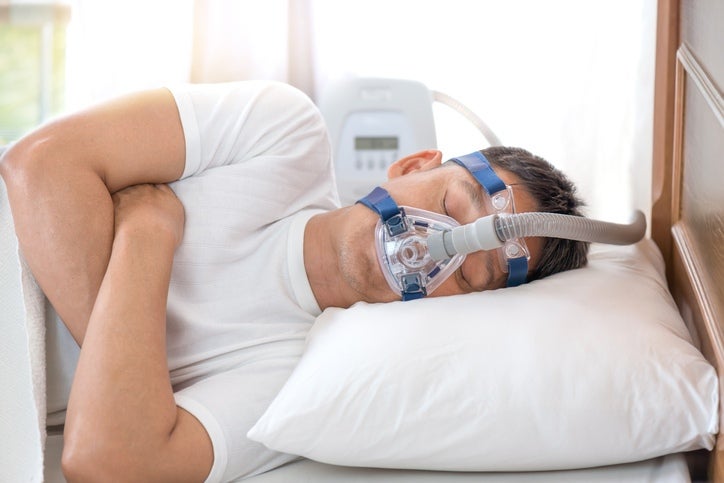Can Sinusitis Lead to Snoring Problems?
Snoring is a common issue that can disrupt sleep and affect overall well-being. While there are many causes of snoring, sinusitis may be an underlying factor often overlooked. If you’ve been dealing with sinus problems and find yourself or your partner snoring more frequently, it’s worth exploring the connection. This blog looks at how sinusitis can contribute to snoring, its relationship with sleep apnea, and effective treatments to address sinus-related snoring.
Below, the team at SoCal Breathe Free Sinus & Allergy Centers San Diego discuss the connection between snoring and chronic sinusitis for San Diego, CA patients. Reach out to our providers today to learn more about our advanced sinus and allergy treatments.

What Is Sinusitis?
Sinusitis refers to the inflammation or swelling of the sinuses. The sinuses are air-filled cavities in the skull around the nose and eyes. Their role is to filter and humidify the air you breathe, as well as to drain mucus. When these passages become inflamed due to infections, allergies, or other triggers, they can become blocked, leading to sinusitis. There are two types of sinusitis:
- Acute sinusitis occurs suddenly and typically clears up within a few weeks.
- Chronic sinusitis persists for 12 weeks or longer, often requiring more complex management.
Common sinusitis symptoms include nasal congestion, facial pain or pressure, postnasal drip, headaches, and fatigue. These symptoms can also interfere with breathing, particularly during sleep, paving the way for issues like snoring.
How Sinusitis Affects Breathing During Sleep
Sinusitis can disrupt normal breathing by causing congestion in the nasal passages. When your nose is stuffed, air struggles to pass through, creating turbulence in the airway. This turbulence results in the vibration of the soft tissues in the throat and mouth, which is the sound we recognize as snoring.
During sleep, your body naturally relaxes. If your sinuses are swollen or blocked, breathing properly through your nose becomes even more challenging. This lack of airflow often forces you to breathe through your mouth, exacerbating snoring. People with sinusitis may also experience interruptions in their breathing due to postnasal drip—the excess mucus can cause coughing or irritation in the throat, which may further affect sleep quality.
Mouth Breathing & Snoring Connection
Mouth breathing is one of the most significant contributors to snoring, and sinusitis often triggers this habit. When nasal passages are clogged, your body compensates by switching to mouth breathing. Mouth breathing changes the position of key structures in your airway. Instead of the nose filtering and conditioning air before it reaches the lungs, breathing through the mouth can dry out the throat. This dryness can increase tissue vibration, making snoring even louder.
Furthermore, mouth breathing during sleep can cause the tongue to fall backward, partially obstructing the airway and intensifying the sound of snoring. This pattern can become a nightly disturbance for chronic sinusitis sufferers who regularly rely on mouth breathing.
Sinusitis & Sleep Apnea: Are They Related?
Another important consideration is the potential link between sinusitis and obstructive sleep apnea (OSA). While sinusitis doesn’t directly cause sleep apnea, the blocked airways and swollen tissues associated with sinus issues can contribute to breathing disorders during sleep. Obstructive sleep apnea occurs when soft tissues in the throat temporarily collapse or block the airway, causing repeated pauses in breathing.
If sinus inflammation and congestion narrow the respiratory passages, it can worsen pre-existing OSA or increase the likelihood of developing symptoms. Sinus-related inflammation may contribute to upper airway resistance, which in some individuals could exacerbate pre-existing sleep disturbances, including obstructive sleep apnea. Both conditions can leave you feeling fatigued and irritable the next day, further underlining the need for effective treatment.

Common Treatments for Sinus-Related Snoring
If you’re wondering how to treat sinusitis, you’re in the right place. While sinus-related snoring can be frustrating, there are several solutions to improve breathing and restore restful sleep. Here’s a breakdown of effective sinusitis treatments for snoring that can help:
- Nasal Decongestants and Sprays – Over-the-counter decongestants or steroid sprays can reduce inflammation and open the nasal passages. Use these as directed and consult with an ENT specialist to ensure safe and effective relief.
- Saline Rinses – Nasal irrigation with a saline solution helps flush out mucus, allergens, and irritants, providing immediate relief from nasal congestion. Neti pots or saline spray bottles are commonly used for this purpose.
- Allergy Management – If allergies contribute to sinusitis symptoms, identifying and avoiding triggers is essential. Antihistamines or allergy shots may also help reduce inflammation and prevent recurrent congestion.
- Humidifiers – Adding moisture to the air with a humidifier can prevent your nasal passages and throat from drying out, making it easier to breathe through your nose. This can also reduce snoring and facial sinus pressure.
- Sleeping Position Adjustments – Sleeping on your side rather than your back can help keep airways open. Elevating your head with an extra pillow or an adjustable bed can reduce nasal congestion and encourage better airflow.
- Medications for Chronic Sinusitis – For those with chronic sinus problems, a doctor may prescribe stronger medications such as oral corticosteroids or antibiotics (if an infection is present) to combat persistent inflammation and blockage.
- Surgical Interventions – If treatments fail to resolve symptoms, surgery may be considered. Procedures like functional endoscopic sinus surgery (FESS) may be recommended to address structural issues contributing to airflow problems and snoring, though outcomes vary based on individual anatomy and health history.
- Addressing Sleep Apnea – For individuals with both sinusitis and sleep apnea, a continuous positive airway pressure (CPAP) machine may be prescribed. This device delivers consistent air pressure to keep the airway open during sleep, reducing snoring and apnea episodes.
Contact Us Today for Sinusitis Diagnosis & Treatment
Sinusitis and snoring are closely connected, largely because sinus inflammation disrupts natural airflow and encourages mouth breathing. Left untreated, chronic sinus issues can escalate into more serious sleep-related problems, such as sleep apnea. If you suspect sinusitis is affecting your sleep and contributing to snoring, consult with our ENT providers to explore the best treatment options.
Addressing underlying sinus issues may improve breathing and support better sleep quality in some individuals. Contact the team at SoCal Breathe Free Sinus & Allergy Centers San Diego if you’re ready to explore long-term treatment strategies, or schedule an appointment online to get started. We’re happy to help residents throughout San Diego, CA and the surrounding areas, including Burbank.
The information provided in this article is for informational and educational purposes only and does not constitute medical advice. It is not intended to diagnose, treat, cure, or prevent any disease or medical condition. Always seek the guidance of your physician or other qualified healthcare provider with any questions you may have regarding a medical condition or treatment.
Results may vary: Treatment outcomes and health experiences may differ based on individual medical history, condition severity, and response to care.
Emergency Notice: If you are experiencing a medical emergency, call 911 or seek immediate medical attention.


